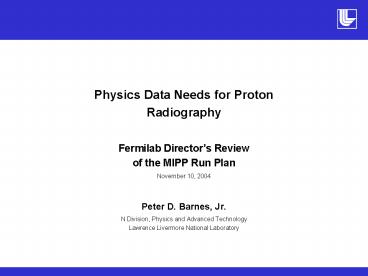Physics Data Needs for Proton Radiography - PowerPoint PPT Presentation
1 / 14
Title:
Physics Data Needs for Proton Radiography
Description:
Peter D. Barnes, Jr. N Division, Physics and Advanced Technology ... P. D. Barnes, Jr., LLNL. Lens Chromatic Dependence Leads to Blur ... – PowerPoint PPT presentation
Number of Views:79
Avg rating:3.0/5.0
Title: Physics Data Needs for Proton Radiography
1
- Physics Data Needs for Proton Radiography
- Fermilab Directors Reviewof the MIPP Run Plan
- November 10, 2004
- Peter D. Barnes, Jr.
- N Division, Physics and Advanced
TechnologyLawrence Livermore National Laboratory
2
What Is Proton Radiography?
3
Advanced Hydrotest Facility Concept
- Stockpile Stewardship Needs Higher Precision
Quantitative Radiography - Multi-Axis, Multi-Frame, SNM
- 1 Density Measurement
- Proton Radiography Has Become The Technology of
Choice - 50 GeV/c, 1012-13 protons, 12 axes, 10-20 time
frames - Full Capability Facility Projected At 3B
4
Forming An Image With Magnetic LensesLANL LANSCE
Line C
Object Vessel
Camera Set 1
Camera Set 2
Proton Beam
Lens 1
Lens 2
View looking into the proton radiography facility
at LANSCE
5
Lens Chromatic Dependence Leads to Blur
- Some of these will be transmitted by the
lens/collimator and be detected - First order momentum dependence of quadruplet
lens - Assume a symmetric lens (o i d/2 5 m)
6
Consider Just the Blur Term
- Off-momentum particle production produces
object-dependent resolution function diffuse
background!
10 mm Spot Size
7
Does Chromatic Blur Matter In Real Experiments?
- French Test Object (FTO)
- Concentric shells
- Central air cavity
Foam
Copper
Tungsten
Air
8
Phase Space of Particles Produced in the FTO
- 50 GeV/c proton beam
- Use Malensek particle production model
- Compute transmission through FTO and scaled E933
lens
Uninteracted Primary Beam Multiple Scattering
10 mr Collimator
q ()
6
3
4
2
5
1
x 1.1 10-4 / GeV / mr / incident proton
Secondary Momentum (GeV/c)
9
MINOS Particle Production Phase Space
- Legend
- Colored points particle production data
- BoxesMINOS n acceptance
- Ratio Measurement
- NumeratorFar Detector (top)
- DenominatorNear Det. (bottom)x Ratio
Prediction - Only relevant measurements are
- 100, 400, 450 GeV NuMI is 120 GeV.
- Be and C NuMI is C target.
10
Comparison of NuMI/MINOS to pRad
11
Relevant Data Is SparseEven For Total Cross
Section
Data compilation by Ed Hartouni
12
Physics Data Needed For Proton Radiography
- A Scaling
- Verify geometric scaling for large A, E
- Direct measurements for small A
- E Scaling
- Direct measurements for large and small A
- Enable 5 interpolations around 50 GeV/c
- (p, pT) distributions for ?, K, p
- Reinteraction cross sections
- Need ?, K, p beams
- Materials directly relevant for hydrotests
- H, Be, C, N, Cu, Pb, DU
13
MINOS Sensitivity to Particle Production Phase
Space
- Consider all the standard models
- GFLUKA, BMPT, MARS, Malensek
- Absolute flux estimates vary by 20
- Oscillation physics isFar/Near ratio
- Use average of models
- Introduces a 510 systematic error, spanning the
range of likely models - MIPP will reduce this systematic error to lt 2
14
Can We Interpolate In Energy/Target?
- High energy (gt 5 GeV) cross sections dominated
by A2/3 0.695 scaling - Residual variations with A, E 3































